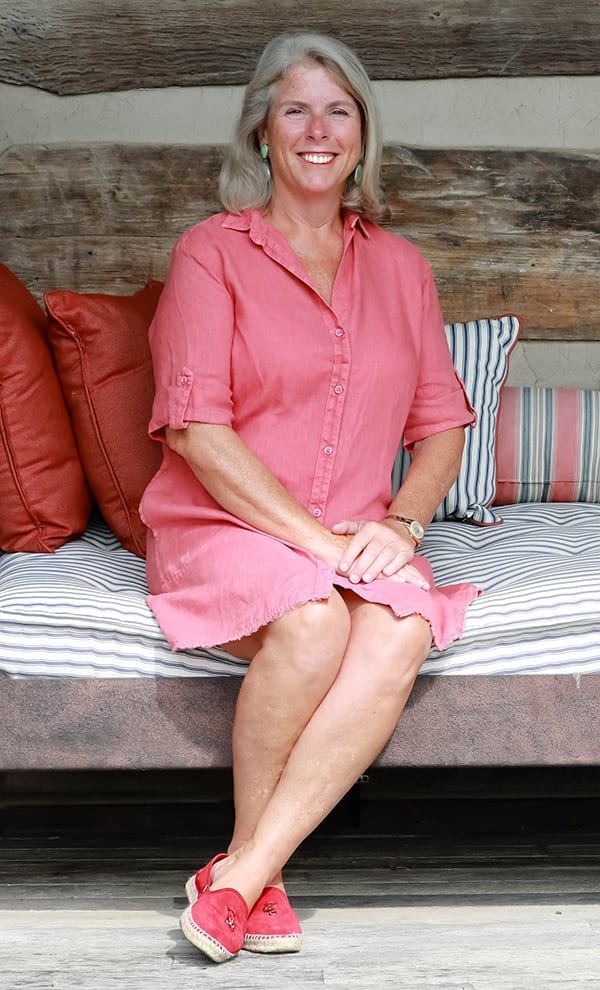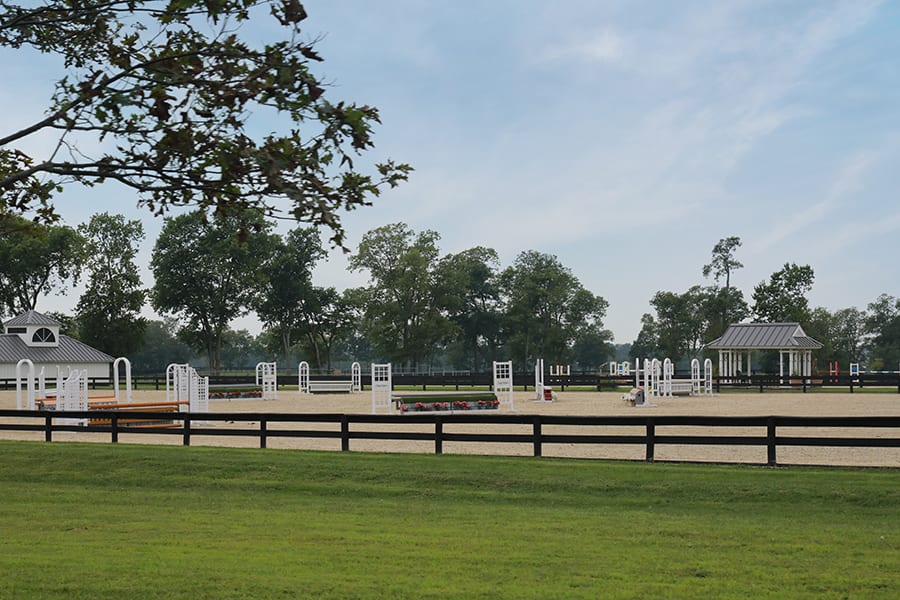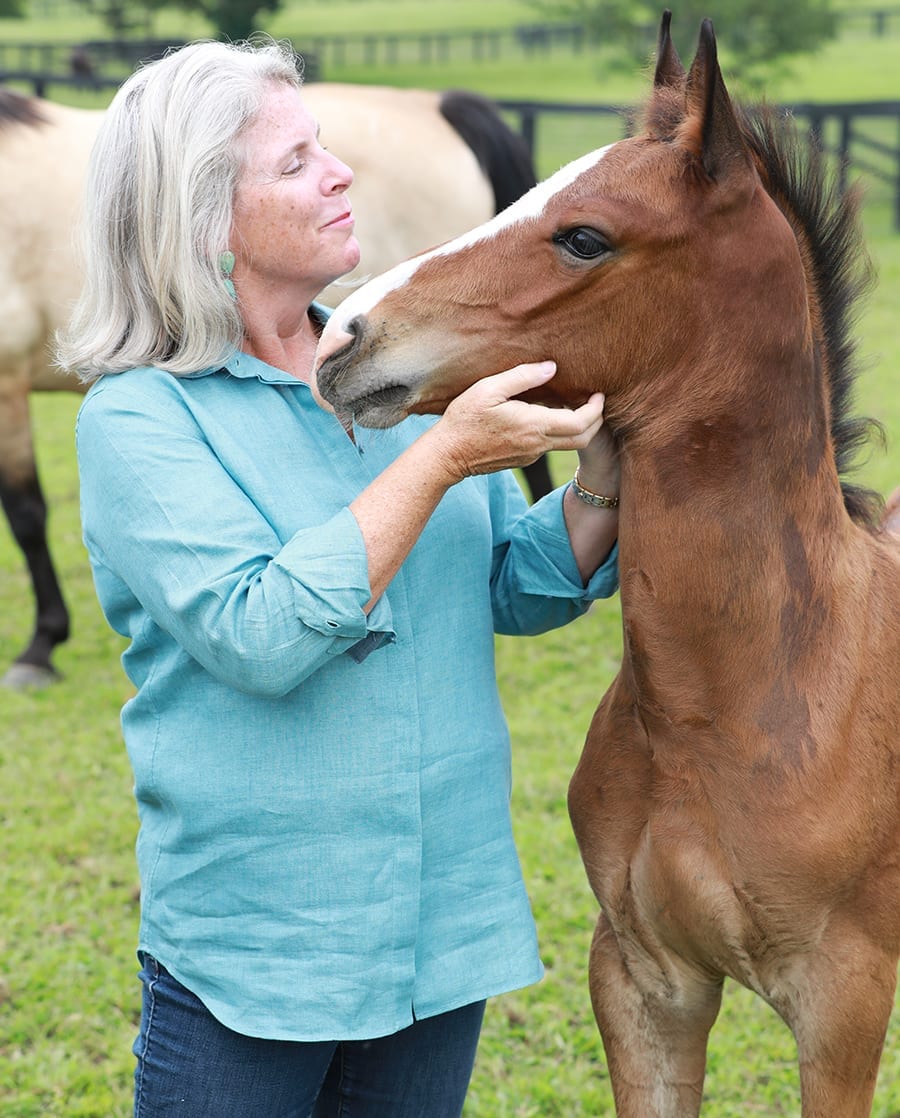Horse Breeder & Tryon International Equestrian Center Partner
The spark that ignited former nurse Lisa Lourie’s passion for horses was actually her daughter. Lisa didn’t start riding until her daughter began lessons. Now, she is the owner and operator of the unique, multidimensional Spy Coast Farm, which specializes in the breeding and development of top quality performance horses. In addition, she is also a partner in the Tryon International Equestrian Center.
Your mother and father shared a profession?
Yes. They met while attending art school while on the GI Bill. My mother was primarily a pastel portrait artist, and my dad a commercial artist. I think I got my marketing skills from him.They lived in Winchester, Massachusetts. My mother was 91 when she died, and my father 93.
When did you take up riding?
As a teenager, I rode a little bit. A friend of mine went to summer camp to ride. In the off-season, she’d bring a few horses back which I would ride to help exercise them. I have never been an accomplished rider.
Were you drawn to them?
Not particularly, but it was fun!
So, where did you go to school and for what?
University of Rochester for my bachelor’s in nursing, and then I went to Lesley for my healthcare management degree. I was an ICU nurse.
After you graduated from college, what did you do?
I went to work at University Hospital, which is Boston University’s teaching hospital. Later, I worked as a nurse at New England Baptist Hospital in Boston. Then, I traveled all over Europe with a girlfriend who was just finishing a two-year stint in the Peace Corps. After six months abroad, I went back to work at Choate Symmes Community Hospital. I developed different skill-sets in every nursing position I held. I was unhappy with the way I was being managed as a nurse. So, rather than complain about it, I enrolled in Lesley College in Cambridge, Massachusetts for healthcare management.

“When she [my daughter] asked to start riding at eight years old, I thought that would be perfect. […] I asked her if she’d mind if I started riding, and she said, “No, that will be great.” So we kept pace for a while.”
![]()
After receiving your master’s, what did you do?
I went to work. Instead of writing a thesis, I had to do a practicum, and I had no idea what the subject was going to be. I was doing some private duty nursing on the side to augment my income. I got a phone call one day, and they said, “Lisa, we have a person with AIDS, and we thought you’d be the perfect person for the job.” After accepting the job, I hung up the phone, and I thought two things. First, I have no idea how to treat a person with AIDS; no one did at that time. It was 1984, ’85. And then I thought, that’s my practicum. So, I did my internship with the head of nursing for the Massachusetts Department of Public Health AIDS Program. There was a lot to be done. I put my emotions to the side and just did the work. Managerially, it was an interesting time. The original team members were typically gay and lesbian. They were there because they shared a common and very earnest interest in those affected by the illness. They had management skills like me. On the heels of the original frontline professionals came the opportunists. It became very political. As a person focused on management, it was really interesting to watch that transition real-time. I went on to work for the CDC still focusing on AIDS. Then, I got married and moved down to Charlottesville, Virginia and had two children.
How did you end up on Long Island?
One summer, my husband’s cousin, Jim Simons, asked him to come for six weeks and work for Renaissance Technologies on Long Island. Robert decided he would rather go on with a planned experiment in Danvers, Massachusetts. I wanted to go to Long Island so that we could be by the water. I knew how these experiments went. They broke down all the time. So, I said, “Okay. The children and I will go up and stay with my parents in Winchester,” which is not far from Danvers. I was positive we were going to end up in Long Island. So, I leased our house to a visiting professor for the summer. Sure enough, two days before we were supposed to leave, the linear accelerator broke down. Robert said, “Well, we’re not going to Massachusetts. We will stay here.” I said, “No, we can’t because I’ve leased out the house. We’re going to Long Island.” And that’s how that whole thing started.
And tell me about that experience.
He really enjoyed it. I rented a little place on the beach, and the kids loved that. We ended up buying it a few years later. We weren’t there for the money. We were there for the experience, to be close to family, and to have a nice summertime. He got hooked. The following year, he took a year’s sabbatical, and we went back for the entire time. Then, he extended the sabbatical for a year. We ended up living on Long Island for the next 19 years.
Did you know, at any point in your life, the equestrian business would become central to your world?
No. Not at all.
All right, so how did this world open up to you?
My daughter, Julia, was very precocious. She always wanted to go on playdates and do things requiring a great deal of time and energy. I saw it was going to get increasingly difficult to manage her, but I didn’t want to squelch her spirit. When she asked to start riding, at eight years-old, I thought that would be perfect. It’s a very disciplined environment, and she had to manage a large animal. I figured that would occupy her. I could drop her off there for two or three hours at a time and do my own thing. It worked out perfectly. She was getting a lot of exercise, and her instructor was teaching her a lot of moves on horseback. I asked her if she’d mind if I started riding, and she said, “No, that will be great.” So, we kept at a pace for a while. When we began looking for a pony for her, we found a horse for me first. And that was the beginning of it all.
Are you in love with horses?
No. I like them a lot, and I like the process of working with them.
Of the interviews that I’ve conducted, most people are in love with horses.
Yes, but I have said many times, they could just as easily be goats. It is a very unpopular view. But I am businesswoman, and it suits me to look at this as a business; and horses are the medium. I do love working with them!
When did you enter the equine business?
Initially, our horse focus was a lifestyle one. A beautiful piece of property came up on the market on Long Island. It was a farm, and I knew I could make it the home of our dreams. I went about creating a space, a bubble, that included a horse farm for me and my daughter. Then a group of maybe eight early teen girls came over from a barn that had closed. I called them my barn rats. They just started working in the barn. I said, “You know, I can’t pay all of you.” They said they didn’t care, they just wanted a place to go. Of course, I ended up paying them. But, that was the start of the community of the barn.
And what did you call that first farm?
Spy Coast Farm.
Where is Spy Coast Farm located?
In Lexington, Kentucky, Wellington, Florida, and Tryon, North Carolina.

As I sit here on this magnificent 800-plus-acre equestrian farm, centrally located in horse country Lexington, Kentucky, I am curious about what you consider your greatest success and why?
Assembling a talented base of employees is probably my biggest success. They are a terrific group of people. I like providing them with the tools, and they seem happy doing work they love.
Tell me about the next acquisition, and how it came about and why.
Julia was going down to the Winter Equestrian Festival. I think it was our second season with Shane Sweetnam as her trainer. The woman that they were working for went through a divorce, and they needed another space. We were coming to Kentucky during the summer so I bought the first Kentucky farm to accommodate everybody. I figured it was a better place to breed horses than Long Island. That is how this all started. Shortly thereafter, I went down to Florida. Shane and his team were in a rental facility down there. I decided to buy a property in Florida where we could live. I was also looking for a place for Shane and Ali to run their business from. To this day, they lease my property down in Florida, and I live in the house. They operate their business out of the 20-acre farm in Wellington, and then they come up here in the summertime. This is home base for the summer. They are great and every bit as much my children as my own children; especially, Shane. I call him my most spoiled child.
What is Shane’s greatest accomplishment, if you had to choose one?
Before this WEG, probably being on the winning European Championship Team. Team Ireland won the Championship last year.
The initial purchase for Spy Coast Farm in Lexington, Kentucky was 300 acres. Why and how did you amass the 800 plus?
The original piece of property was a little over 300 acres. There was an adjoining 65-acre parcel, but they wouldn’t sell it to a neighbor. I saw that as a challenge. I had a shill buy it for me, and within 24 hours, we flipped it over to me. I wanted it available for the Kentucky Horse Park to use for their WEG in 2010. I did not know to what degree I would actually expand. The genesis of the expansion occurred when I was down in Wellington. My daughter was doing the High Junior Jumpers by then, and I started thinking that these kids had the best horses on the show grounds. A lot of them are Grand Prix horses coming down off high-performance careers. I asked what would happen to these horses when they retired, and the answer was nothing. They didn’t send them back to Europe. They didn’t give them to a breeder. They had to pay to farm them somewhere. So, I started accumulating them. I learned about pedigrees. I talked to Shane, who knew quite a bit about breeding, and that’s when we started the breeding in earnest. People would just give me horses, like Grand Prix mares, because they knew they were going to a nice home. I was going for high-end clientele and high-performance horses. I wanted all the farms to be beautiful places they would come back and visit and know their horse would be well taken care of.
You really are looking for this second generation of horses that are exceptional. How does that work?
Essentially, the temperament matters a great deal and is typically given less attention in Europe. I believe it should be given a lot of attention in the U.S. market, which is probably 98 percent amateur. If I want to sell horses, they better be rideable and have the proper temperament. I had a rule: I wouldn’t buy a horse for Shane unless it was a stallion or a mare. If it was a stallion, I personally had to be able to go into the stall and pet the horse. And, to this day, I can. It is that temperament that I want to propagate. The goal is for our horses to be of good temperament, good ability, good scope and movement and conformation.
Is your business model unique?
There are veterinarian-owned rehab and fitness centers and many rehabilitation centers, but none that I know of are associated with a multidimensional farm like mine. I don’t believe there are farms that focus on breeding, training, rehabilitation, and other core services in the US. Maybe in Dubai or somewhere else abroad. I truly don’t know all of the places that offer these services.
How does the Tryon International Equestrian Center play into the equation?
I am a partner, so that is why I’m involved in Tryon. And, we also bought a 70-acre farm close to TIEC.
How do you decide to acquire property?
It is location, location, and location. The goal is to develop the property in a way that would eventually appeal to another high-end purchaser. This 400 acres is subdivided into seven different sections. Each one has the capacity for a barn and a house. I could divide it up (it is right next to the horse park) and probably make three times what I’ve paid for it. These are very long-term investments. Let’s put it this way: I purchase property because it’s what I like to spend my money on, not fast cars, or yachts, or expensive jewelry.

The World Equestrian Games is a monumental challenge because this is a project that’s been under construction for 18 months as opposed to the typical ten years. How have the partners engaged?
The partnership consists of five main partners. We are all in. We believe in the project and have put extra money into it. It’s a very difficult task to build the platform for the World Equestrian Games in 18 months rather than four years. And, on top of that, TIEC is a new facility. So, this will be a monumental task to pull off, but we see the vision. And we will do it. Much like my team here, Mark and Katherine have teams in Wellington, and now in Tryon, that are exceptional. They have a motto, “Swim like a duck.” In other words, you look nice and peaceful up above the water, but you’re paddling like hell underneath. So, they say, “Look like a duck.” And that’s what they do. They know their jobs, and they will pull it out. Every time we consider hiring a consultant, we are disappointed because we compare them to our own people who can do it just as well or better. I know WEG will be a success.
How do you pay it forward?
I do a lot of mentoring, particularly of women. I provide paid internship opportunities. I often hire people who could use some direction. For whatever reason, I have always had a lot of self-confidence. I like to pass that on, particularly to women. I enjoy letting them know they can achieve almost anything they want with hard work. I like helping them network with people, other women like you and me, who will help them realize their dreams. That is probably the best way I pay it forward.
What life lesson can you share with our young readers?
It’s very important that you have a career or job or some kind of skill that you can support yourself because you never know what will happen in your life. Whether you have a child, get divorced, or move to a difficult place, whatever happens, you need to be able to support yourself. Your self-esteem comes from your ability to take care of yourself and your children if you choose to have them. So, set yourself up to have a skill set that will allow you to take care of number one. You come in alone and go out alone. You need to know how to take care of yourself.

